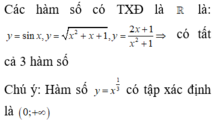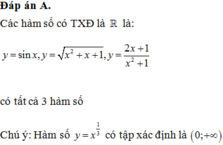Cho: x+1/x = a Tính: x13+1/x13
Hãy nhập câu hỏi của bạn vào đây, nếu là tài khoản VIP, bạn sẽ được ưu tiên trả lời.


\(x^2-\left(m+2\right)x+m=0\left(1\right)\)
Để phương trình (1) có nghiệm thì:
\(\Delta\ge0\Rightarrow\left(m+2\right)^2-4m\ge0\)
\(\Leftrightarrow m^2+4\ge0\) (luôn đúng)
Vậy \(\forall m\) thì phương trình (1) luôn có nghiệm.
Theo định lí Viete cho phương trình (1) ta có:
\(\left\{{}\begin{matrix}x_1+x_2=m+2\\x_1x_2=m\end{matrix}\right.\)
\(A=x_1^3-\left(m+1\right)x_1^2+mx_1-5m\)
\(=x_1^3-\left(x_1+x_2-1\right)x_1^2+x_1\left(m-5\right)\)
\(=x_1^3-x_1^3-x_1^2x_2+x_1^2+x_1\left(x_1x_2-5\right)\)
\(=-x_1^2x_2+x_1^2+x_1^2x_2-5x_1\)
\(=x_1^2-5x_1=\left(x_1^2-5x_1+\dfrac{25}{4}\right)-\dfrac{25}{4}=\left(x_1-\dfrac{5}{2}\right)^2-\dfrac{25}{4}\ge-\dfrac{25}{4}\)
Vậy \(MinA=-\dfrac{25}{4}\).

a) x2 + 2x + m - 1 = 0 (1)
Với m = 2 ta có (1) trở thành
x2 + 2x + 1 = 0
Có \(\Delta=2^2-4.1.1=0\) nên phương trình nghiệm kép
\(x_1=x_2=-1\)
b) (1) 2 nghiệm phân biệt khi \(\Delta=2^2-4.\left(m-1\right)=8-4m>0\Leftrightarrow m< 2\)
Áp dụng hệ thức Viete cho (1) ta có
\(\left\{{}\begin{matrix}x_1+x_2=-2\\x_1x_2=m-1\end{matrix}\right.\)
Khi đó \(x_1^3+x_2^3-6x_1x_2=4.\left(m-m^2\right)\)
\(\Leftrightarrow\left(x_1+x_2\right)^3-3x_1x_2.\left(x_1+x_2\right)-6x_1x_2=4\left(m-m^2\right)\)
\(\Leftrightarrow\left(-2\right)^3-3.\left(-2\right).\left(m-1\right)-6.\left(m-1\right)=4.\left(m-m^2\right)\)
\(\Leftrightarrow4m^2-4m-8=0\Leftrightarrow\left(m-2\right).\left(4m+4\right)=0\)
\(\Leftrightarrow\left[{}\begin{matrix}m=2\left(\text{loại}\right)\\m=-1\left(tm\right)\end{matrix}\right.\)
Vậy m = -1 thì thỏa mãn ycbt

a)
Xét x=0 => A = 1 không là số nguyên tố
Xét x=1 => A= 3 là số nguyên tố (chọn)
Xét x>1
Có A = x14+ x13 + 1 = x14 - x2 + x13 - x + x2 + x + 1
A = x2(x12-1) + x(x12-1) + x2+x+1
A = (x2+x)(x3*4-1) + x2 + x + 1
Có x3*4 chia hết cho x3
=> x3*4-1 chia hết cho x3 - 1 = (x-1)(x2+x+1)
=> x3*4-1 chia hết cho x2+x+1
=>A chia hết cho x2+x+1 mà x2+x+1 >0 (do x>1)
=> A là hợp số với mọi x > 1 (do A chia hết cho x2+x+1)
Vậy x=1 để...

Ta có: \(26\times8+4\times13-10\times26\)
\(=13\times2\times8+4\times13-10\times2\times13\)
\(=13\times16+4\times13-20\times13\)
\(=13\times\left(16+4-20\right)=13\times0=0\)

\(a,\dfrac{5}{13}\times\dfrac{4}{15}\times13=\dfrac{5\times4\times13}{13\times5\times3}=\dfrac{4}{3}\\ b,\left(\dfrac{3}{7}+\dfrac{5}{2}\right)\times\dfrac{7}{5}=\dfrac{3}{7}\times\dfrac{7}{5}+\dfrac{5}{2}\times\dfrac{7}{5}=\dfrac{3}{5}+\dfrac{7}{2}=\dfrac{6}{10}+\dfrac{35}{10}=\dfrac{41}{10}\\ c,\dfrac{1}{5}\times\dfrac{11}{18}+\dfrac{11}{18}\times\dfrac{3}{5}=\dfrac{11}{18}\times\left(\dfrac{1}{5}+\dfrac{3}{5}\right)=\dfrac{11}{18}\times\dfrac{4}{5}=\dfrac{22}{45}\)


